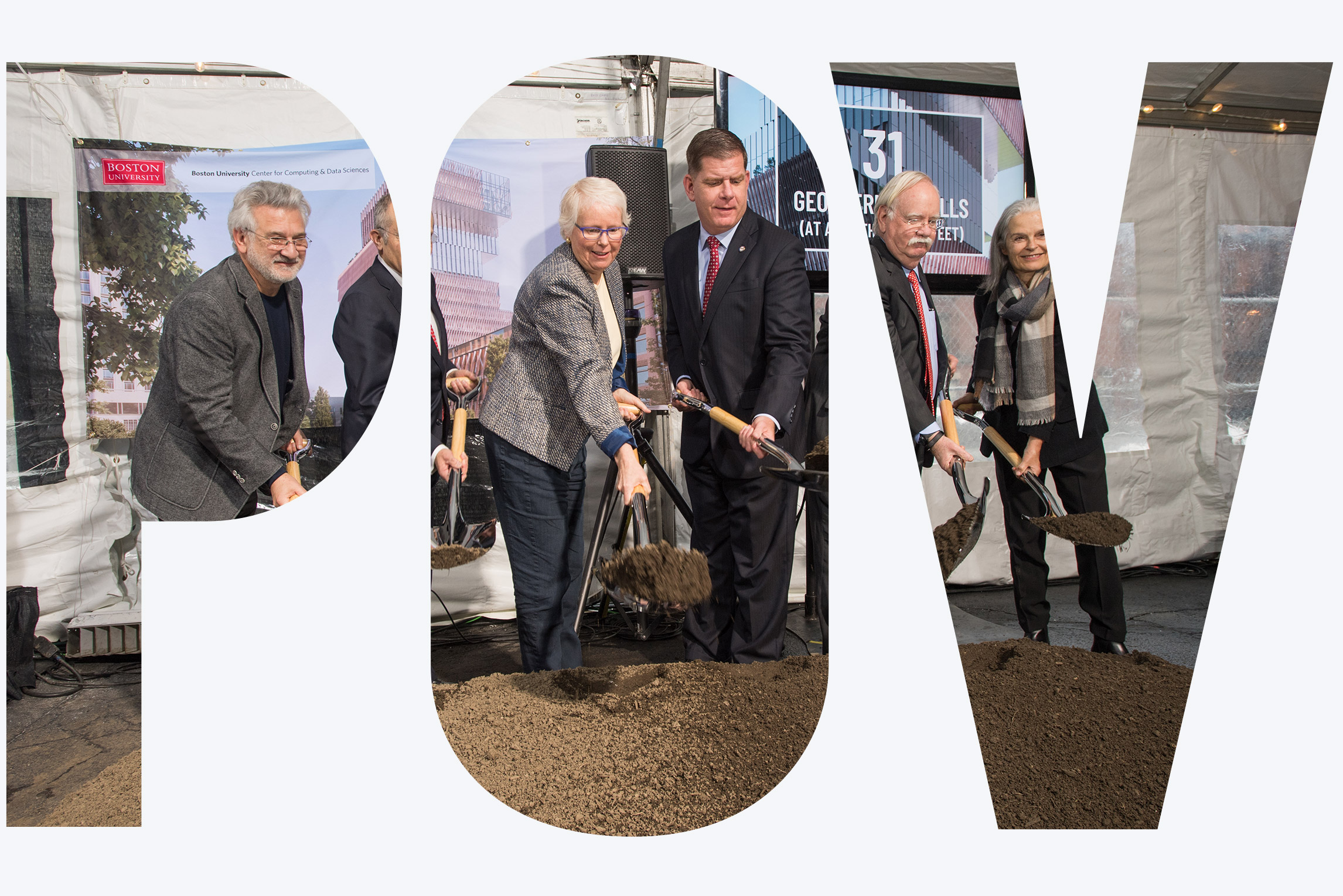POV: BU President Robert A. Brown and Boston Mayor Martin Walsh on BU’s Carbon Neutrality Commitment

POV: BU President Robert A. Brown and Boston Mayor Martin Walsh on BU’s Carbon Neutrality Commitment
University’s new computing and data sciences building “shows what’s possible when we work together and make climate action a top priority”
This piece first appeared on the CommonWealth website. It is republished on BU Today with permission.
This week, we broke ground on the most energy-efficient large building in Boston’s history. Boston University’s new Center for Computing & Data Sciences is a milestone achievement for green architecture, and it’s exactly the kind of project that will help us achieve our commitment to make our entire city carbon neutral by 2050.
Boston is a national and global leader in the fight against climate change. As a coastal city, we understand what’s at stake. In the past few years, we’ve experienced serious flooding and storm surges. We’ve had historic snowstorms and record-breaking heat waves. For us, fighting climate change is about protecting the health and safety of our residents. It’s about making our city stronger and more resilient for generations to come.
In addition to protecting our neighborhoods from these impacts, we’re also making major cuts to the carbon emissions that cause climate change to begin with. We’re already ranked the most energy-efficient city in the United States, and we’re reaching higher by mobilizing a citywide coalition, one that includes government, businesses, nonprofits, residents, youth, faith communities, and our world-class colleges and universities.
Together, we’ve charted a clear course for achieving carbon neutrality. Our Carbon Free Boston report identifies our buildings as the biggest source of carbon emissions in our city, accounting for about 70 percent of our greenhouse gas emissions. In addition to strict new zero net carbon standards for all municipal buildings and programs to help existing privately owned buildings decarbonize, we’ve also called on property owners across our city to step up to the plate and make sustainability a central component of all new projects. Several employers and institutions, including Boston University, have stepped up in a big way.
In many ways, this remarkable new academic and research building symbolizes Boston’s approach to climate change.
The new Center for Computing & Data Sciences checks all the boxes in the Carbon Free Boston report, and more. The city and Boston University worked together for many years on the design of the new building, which is exceptionally energy-efficient and uses 100 percent renewable energy. The building will tap into a geothermal well-field, a sustainable natural energy source 1,500 feet below the surface of the Earth.
The moderate temperatures of the deep geothermal well, coupled with state-of-the art insulation and natural light, will keep the 345,000-square-foot building warm in the winter and cool in the summer, all without the use of fossil fuels. Also, the building is designed to be resilient to coastal flooding, which is projected in long-term worst-case scenarios.
For perspective on how significant this project is, consider this: Boston University is one of our city’s largest landholders, and this is one of the biggest buildings in the University’s 180-year history. The Center for Computing & Data Sciences is a bold statement. It shows what’s possible when we work together and make climate action a top priority.
In many ways, this remarkable new academic and research building symbolizes Boston’s approach to climate change. Faced with a daunting global challenge, we choose to lead. We look at the challenge as an opportunity to draw on the talent and creativity of our people and make our city and our world better. The city of Boston called on landowners to make their new buildings the most sustainable in the nation, and the result is a new Boston landmark that will help inspire generations of students to think big and act with informed conviction.
As Boston develops new energy performance standards for all new buildings, the Center for Computing & Data Sciences will be a model. It will also demonstrate the cost-savings of climate-sensitive building designs because of their lower energy demands and their resiliency to extreme weather and flooding. Our hope is that the center establishes a benchmark that will stimulate a new wave of excellence in design and sustainability, in Boston and beyond.
Boston is a hardworking community that never backs down, even when we’re up against the greatest odds or the fiercest opponent. As a city, we’ve always led the way forward, from the Revolution to civil rights to marriage equality to medical breakthroughs, and now, climate change. This is the defining challenge of our time, and we will overcome it with Boston’s values of innovation, teamwork, and hope.
Martin J. Walsh is the mayor of Boston, and Robert A. Brown is the president of Boston University.
“POV” is an opinion page that provides timely commentaries from students, faculty, and staff on a variety of issues: on-campus, local, state, national, or international. Anyone interested in submitting a piece, which should be about 700 words long, should contact John O’Rourke at orourkej@bu.edu. BU Today reserves the right to reject or edit submissions.
Comments & Discussion
Boston University moderates comments to facilitate an informed, substantive, civil conversation. Abusive, profane, self-promotional, misleading, incoherent or off-topic comments will be rejected. Moderators are staffed during regular business hours (EST) and can only accept comments written in English. Statistics or facts must include a citation or a link to the citation.